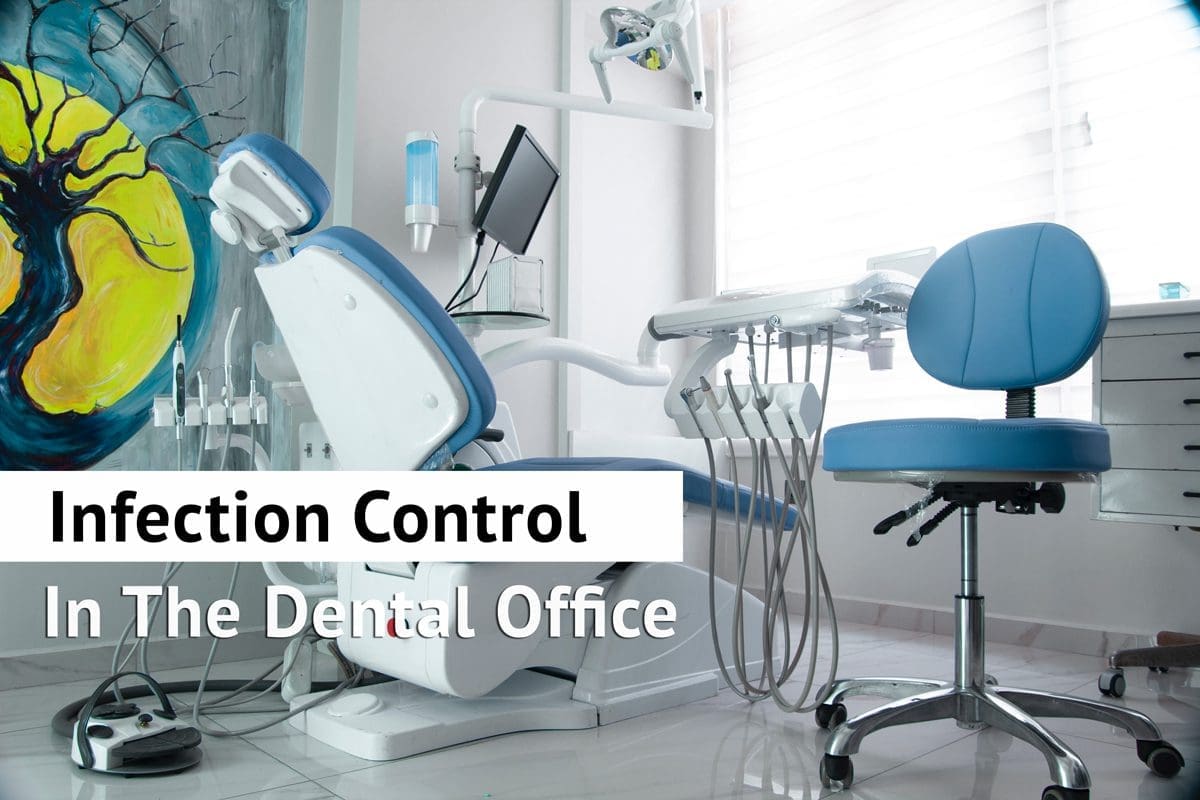
Infection control procedures are actions taken in healthcare facilities to prevent the spread of disease. The Centers for Disease Control and Prevention recommends infection control in dental offices.
Your dentist is concerned about your safety and strives to prevent the spread of infection. Therefore, before entering the exam room, all surfaces, such as the dental chair, dental light, drawer handles, and counters, have been cleaned and disinfected.
Offices may cover some equipment with protective covers, which are replaced after each patient. Non-disposable items, such as dental tools, are cleaned and sterilized between patients. Disposable dental instruments and needles are never reused.
Infection control precautions require that all dental personnel involved in patient care use appropriate protective equipment when necessary, such as gloves, masks, gowns, and goggles.
After each patient, disposable gloves and masks are discarded. Then, before seeing the next patient, all treatment team members wash their hands and put on a new pair of gloves.
Patient welfare is essential to your dentist and dental staff. That’s why infection control procedures are in place in your dental office.
Patients go to the dentist to have their teeth cleaned, fixed, and polished. So naturally, they want pleasant service and competent treatment. You don’t want an infection caused by something your dentist or his staff did wrong.
Proper sterilization and infection control procedures are critical to patient and staff safety. But, especially in light of COVID-19, we all know how simple essential measures can be to help prevent the spread of disease and infection.
Whether you work in a dental office, plan to work in a dental office, or visit one regularly, you need to understand why infection control is critical and how to take care of it in whatever role you perform.
While the principles of infection prevention and control remain unchanged, new technologies, materials, equipment, and recent data suggest the importance of ongoing evaluation of current infection control practices and continuing education of the oral health care team.
Regardless of the patient’s visit, infection control is vital to the safety and effectiveness of their oral health.
Procedures and recommendations established by the Centers for Disease Control and Prevention (CDC) help prevent the transmission of infections such as hepatitis B, hepatitis C and HIV in the dental office.
It would be bad enough if you caught an illness from your patient, and even worse if you spread something to them. But imagine a single disease spreading throughout the city, state, and even the entire country.
In addition to COVID-19, inadequate sterilization and infection control can spread other viruses and diseases such as hepatitis, influenza, measles, and strep throat. Preventive measures keep the entire community safe.
Bacteria are among the fastest-growing organisms in the world. Unfortunately, they can also carry several diseases and illnesses, some of which can be deadly.
So how do you stop them? Proper sterilization techniques in the office kill bacteria. If tools and equipment are disinfected frequently and adequately, bacteria are eliminated.
A small mistake or oversight can lead to severe illness or even death. If a patient were to fall ill, or if a COVID-19 outbreak were linked to your practice, it could deter patients from coming to your practice. It could even damage your practice’s reputation.
When you follow the right policies, you demonstrate integrity and care for your patients.
Dentists and their staff should educate patients about proper oral hygiene. But you can’t expect them to follow your advice if you don’t follow appropriate protocol.
When you show patients that health and safety are essential, you promote good health practices in your dental office and the community at large.
Your well-being and the well-being of other patients and the dental office’s staff are paramount, which is why infection control procedures should be in place in a dental office.
It’s crucial to prevent the patient-to-patient transfer by cleaning all surfaces, such as chairs, dental lights, instrument trays, and counters, and ensuring protective barriers are placed before each patient.
Non-disposable instruments should be sterilized, cleaned, and individually wrapped, while disposable items should never be reused and should be disposed of properly in biohazard containers.
Protecting dentists, dental assistants, dental hygienists, and other staff is also essential. Therefore, the dental team must follow proper handwashing and use gloves, masks, jackets, and eyewear known as personal protection equipment (PPE).
New gloves and masks should be donned for each patient. Following stringent procedures and complying with all regulations safeguard and protect patients and dental staff.
FDI supports the following statements:
Recommendations, guidelines, and regulations should be developed in consultation with the dental profession. Any legislation and/or guidance issued should be clear, feasible and practicable, and disseminated on time;
Recommendations, guidelines, and laws affecting standard precautions required in dental practices must be evidence-based or based on international best practices. In the absence of sufficient empirical evidence, the considered judgments of a widely recognized assembly of experts should provide the foundation for guidance.
Practices should receive adequate financial reimbursement when additional costs are incurred related to compliance with new infection control guidelines implemented in the face of unknown risks.
Governments, relevant national bodies, and local/regional dental associations should educate the public on the importance of proper infection control in the dental office, the effectiveness of such recommended procedures, and consequently, the absence of a significant risk of contracting the transmittable disease when dental care is provided.
Infection prevention and control in dental practice should be a recurring theme in continuing education.
Members of the oral health team are obliged to keep their knowledge and skills current regarding diagnosing and managing infectious diseases that may be transmitted in the clinical setting.
They must adhere to standard precautions and, where necessary, new IPC precautions as established by the relevant authorities and take appropriate measures to protect their patients, staff, and themselves against infection.
These measures include:
– Adopting the principles of cleanliness and disinfection of all exposed surfaces in the work environment.
– Following protocols accepted and/or recommended by relevant authorities for the decontamination, disinfection, sterilization, ventilation and reprocessing of reusable instruments, and disposal of clinical waste4.
– Assuring sterile instruments are protected from recontamination using an appropriate sanitary barrier system.
– Using single-use instruments where required.
– Exercising special care with the use of sharps and contaminated material; removing them from the work area after use and disposing of them in a clearly labeled puncture-resistant container with traceability of disposal.
– Adopting disinfection principles for devices, prostheses, impressions, instruments, and valuable items transported to and from the dental laboratory.
– Handle biopsy specimens carefully and place them in leak-proof containers according to the recommended guidelines.
– Designing (new) dental clinics that ensure good air ventilation and reasonable air exchange rates to facilitate infection control.
FDI urges all dentists and members of the dental team:
– To be knowledgeable about and protected from health problems occurring from using enhanced personal protective equipment.
– To be appropriately vaccinated against infectious diseases is a priority, according to current guidelines issued by the relevant authorities.
– Immediately initiate an appropriate assessment to determine the need for post-exposure testing and prophylaxis following occupational exposure to blood-borne pathogens, including HBV, HCV, and HIV6.
– To be aware of signs and symptoms that indicate the possibility of blood-borne and other infectious diseases and receive the necessary diagnostic tests when the infection is suspected. FDI opposes legislation that mandates universal screening of oral health professionals for blood-borne pathogens.
– To comply with medical advice and relevant regulations regarding the continuation of, or limitations to, clinical practice, particularly that of exposure-prone procedures if a blood-borne viral infection is diagnosed.
FDI believes that it is essential that all patients with contagious infections disclose their status to their dentist as part of their medical history to ensure safe and effective oral health care is provided.
All patients should have access to oral health care regardless of their blood-borne or infectious disease status.
FDI urges all dentists and members of the dental team:
– To be alert and triage/screen for signs and symptoms of blood-borne and other infectious diseases in their patients.
– To advise patients with a relevant medical history of the need for referral to the most appropriate health care provider commensurate with their disease status or condition suggestive of infection. Patients should receive proper evaluation and treatment in a supportive environment with full regard to privacy.
– To have an appropriate protocol, by applicable relevant laws, for the confidential handling and sharing of patient information;
to inform patients of the applicable privacy policy in all settings where dental care is delivered.
– To share information about the patient’s medical condition with other health workers as permitted by relevant regulations and with the patient’s consent.
– To educate patients regarding various aspects of blood-borne and other infectious diseases in the context of managing oral diseases.
Infection control products are one of the essential supplies for a dentist. They play a vital role in dental practice because of their ability to sterilize tools and equipment.
Providing your dental procedures in the cleanest, safest, and most disinfected manner is a goal that only large dental practices can achieve.
Our infection control products are vital to providing a proper dental practice, so we make it a point to offer the best options available.
Browsing our catalog: https://dentalassets.com/product-category/dental-supplies you will find the perfect infection control products to take your dental practice to the next level.
At Dental Assets, we offer the best infection control supplies for your practice. Become a comprehensive and complete dental professional by purchasing what we provide in this supply section.
We provide the best dental instruments for dentists looking to keep up with modern dental procedures. Never pay more to meet the most outstanding high-quality standards.
By purchasing our quality infection control supplies, you’ll make your patients’ lives easier by turning your workspace into a complete dental office nerve center.
At Dental Assets, we look forward to assisting our customers with their infection control product requirements and inquiries. So please call us at (888)518-5788 or contact us to discuss your needs and find custom solutions tailored to you.

17821 E 17th St
Ste 180
Tustin, CA 92780
*Opt-in / Opt-out
**Customers provide their phone number and consent to receive messages via a form on our website